During June 2012 Tinashe G Tendayi attended the European Business School (Bachelor & Master Session), here is his story.
Pre-departure
The first thing I did before anything else was to search for the best prices for flights to Frankfurt because I had been wisely advised that it is always cheaper to book way in advance and also that prices would likely rise as a result of the 2012 London Olympics in July. After a bit of logistical planning and shopping around, I eventually settled for a reasonably priced flight that allowed me to travel with the other three Summer School students from Stellenbosch University. I made the booking through a travel agent although to be quite honest, I was better off booking online because I only saved myself R50 which was really not worth it considering the amount of time and effort I spent dealing with the agent. Concurrent with looking for the best flights, I also familiarised myself with the requirements for obtaining my Schengen Visa. This information was readily available from the German consulate website and was relatively easy to follow. One key requirement for applying for a Visa was that I be in possession of documentation for proof of study at EBS and also proof of accommodation for the duration of my stay there. This proved to be the main bottleneck and it took a while before I received the above-mentioned documents. As for the actual handing in and processing of the application itself, it was a breeze and I had my visa within four days of applying. And the best part is that, for a reason best known to the German Consulate officials, I had a waiver on the R600 application fees!
In as far as clothing is concerned, there was no reason for me to shop around for a new wardrobe as it was summer over there. If anything, I needed to leave a lot of the warmer clothes I was using during the South African winter. Being a post-graduate research student, I also had to make sure that all my work was up to date and that the three weeks I would be away would not jeopardise my academic progress. This of course meant putting in the extra hours and making provisions with my academic supervisor for my leave of absence.
Another important part of the preparation procedure is the emotional and mental one. For people like me who were travelling overseas for the first time, not being prepared for the completely new environment and the potential culture shock can really go against you. As the date of my departure drew nearer, I researched as much as I could about Germany and German culture. I also gave myself realistic expectations and I allowed room for disappointment knowing that not everything will work out exactly the way I want it during my stay there.
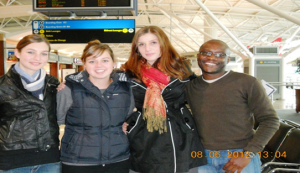
Summer School
The academic programme incorporated an interesting mixture of interactive lectures, discussions, workshops and site visits all under the theme “Doing Business in Europe”. Topics included:
- Leadership
- Cultural Differences in Europe
- The Economics of the European Integration – which was a series of lectures followed by a trip to the European Parliament in Strasbourg, France
- Business as unusual , The Case of Dialogue Social Enterprise – a combination of lectures and a “Dialogue in the Dark” workshop
- Marketing management in the Automotive Industry – a lecture which was followed by a visit to the Opel Car Manufacturing plant in Rüsselsheim, Germany
- Retailing in Europe – a lecture which was followed by a WalMart Case Study
- Renewable Energies – a lecture that was followed by a visit to JUWI Clean energy and Mobility Center Headquarters and a tour of the Wind and Solar Park
The remainder of the programme was spent taking part in a business game simulation using TOPSIM® General Management software. The simulation game helped establish the link between management theory and business practice and covered almost all areas that a typical multinational l corporation would have.
The course had a final exam which was split into two parts. The Business Game simulation constituted 50% of the final grade and then we wrote an essay style, open book exam on the last day of the programme.
I also had the opportunity of doing some sight-seeing of my own in-between the academic programme. I managed to visit the beautiful city of Cologne where I saw the colossal Cologne Cathedral. I also went to the city of Heidelberg where I saw the famous Heidelberg Castle. I also had brief personal tours of Frankfurt and Wiesbaden. For the duration of my stay, I was living in small town called Oestrich and was staying in a lovely private accommodation situated in the attic of a vine yard owned by a charming elderly couple. The flat was conveniently situated across the road to shopping centres and a bus station and it was also 10m minutes’ walk to Hattenheim train station. I always boasted that my flatmate from Thailand and I probably had the best location of all the Summer School houses!
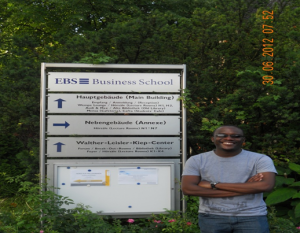
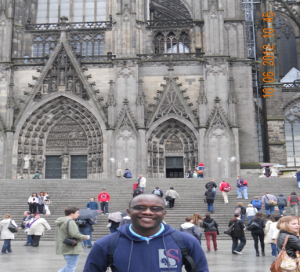
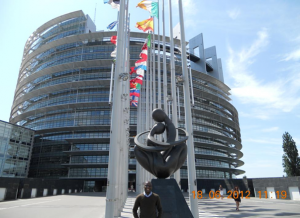
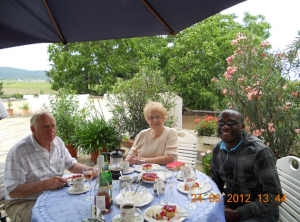
When comparing my experience at EBS to that at Stellenbosch University, many similarities and differences can be observed. For one, the location of the main campus in Oestrich-Winkel, which is a picturesque town nestled in the wine-growing hills of the Rheingau region, reminded me of Stellenbosch which has similar surroundings. The course intensity and teaching styles at EBS are also quite similar to that at Stellenbosch. However, EBS seems to more emphasis on application of theory to business practice. EBS also has a far smaller student to lecturer ratio making for a more interactive learning environment. Other general observations are that Germany as a whole has a better transport network with efficient trains and buses making moving around much easier. Their waste management system is also excellent with a strict attention to detail being observed on how waste is disposed of.
Return
After such a unique and exciting experience, returning to life in Stellenbosch required a bit of effort. First there was the issue of jet-lag which took me a good two days to recover from after we were forced to fly 16 ½ hours non-stop due to a flight delay in Frankfurt. My body also had to acclimatise since I was from the warm summer conditions in Europe to the cooler winter conditions back in South Africa. After recovering from that, it was back to business as usual as I had some catching up to do on my academic work. On a lighter note, I also had to re-adjust to having traffic moving on the left side of the road and not on the right as is the case in Germany!
One outstanding feature I picked out from my trip abroad was the way in which traditional values and customs have managed to co-exist with advances in technology. Without going into detail, the German people seem to have maintained what makes them “German” and at the same time become world leaders in many areas. This was clearly illustrated by the Walmart case where the American giant was forced to leave Germany after failing to accept the German way of working and doing business. This is a lesson worth learning from as Africans in general and South Africans in particular. People do not have to adopt the western world-view “hook, line and sinker” at the expense of their African heritage and tradition. On the other hand, after interacting with students from all over the world, I was made to better appreciate the diversity of cultures and races that exist in South Africa. This is a privilege that a lot of the countries, including Germany, do not have as their communities are rather closed and so miss out on the richness that diversity offers.
My experience abroad has made me eager to explore more of Germany and Europe, and the world as a whole. There was so much to take in and enjoy and three weeks was never going to be enough for it all. A longer exchange with a programme similar to the EBS Summer School would definitely be a good idea and if another opportunity affords itself, I will grab it with both hands! And about my future career plans, I can’t help thinking how wonderful it would be to be involved in something as noble as the Dialogue Social Enterprise. I am convinced that being a social entrepreneur will be a very good long term goal and that I can use the expertise I am acquiring as an industrial engineer to that end. My exposure has equipped me to not only look at working or doing business in South Africa or my home country of Zimbabwe, but rather to look at the whole world as one village full of endless potential.
Conclusion
I will definitely recommend this programme to anyone who has a desire to broaden their horizon and look beyond the four walls of South Africa or even Africa as a whole. The experience abroad will be stimulating and very enjoyable and will literally transform you into a global citizen able to study or work anywhere in the world.
